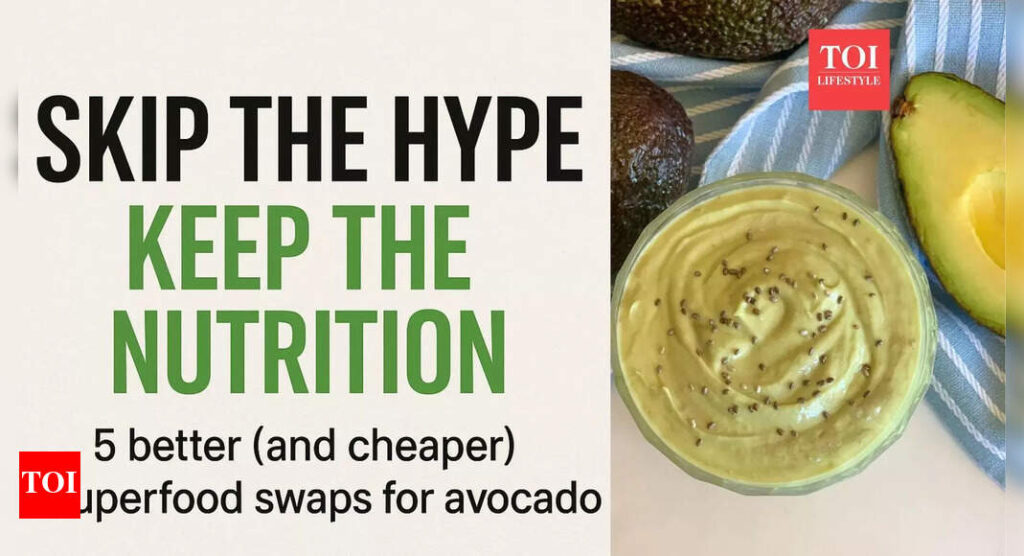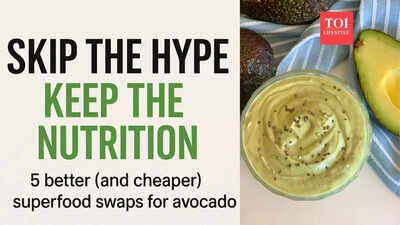Skip overrated Avocado: Chia seeds to hummus, 5 smarter superfoods that deliver more nutrition and health benefits

Avocado toast has become ubiquitous on brunch menus and wellness feeds. Rich in fibre, healthy fats and vitamins, the avocado has earned its “superfood” badge yet for many, especially in regions like India where a single avocado can cost up to ₹300, the question arises: Is it worth it? Avocado toast has become a breakfast anthem for being creamy, Instagram-ready and calorie-dense but if your grocery bill groans every time you buy one, you will be glad to know that there are five delicious and often cheaper foods that deliver the same or better nutrition for everyday use. Think of this as a smart, science-backed swapping to keep the mouthfeel, up the nutrient punch and spend less.
Olive oil and olives: The heart-smart fat with a long resume
If you are after the heart-healthy monounsaturated fat that makes avocado such a go-to, extra-virgin olive oil and table olives are elegant and flavourful alternatives. They are rich in MUFAs and polyphenols (like hydroxytyrosol) that fight inflammation and support vascular health. A 2022 large observational analysis in Journal of the American College of Cardiology linked higher olive-oil intake with lower cardiovascular and all-cause mortality, which is a strong signal that swapping in olive oil for saturated fats is a smart move. In other words, the study found higher olive-oil intake associated with lower risk of total and cause-specific mortality.
Chia seeds : Tiny but mighty for fibre and omega-3s
A tablespoon of chia seeds give you a serious fibre and plant-omega boost (alpha-linolenic acid) that both fills you up and supports heart and metabolic health. Published in Nutrition & Metabolism, the 2024 meta-analyses in overweight populations show chia supplementation reduces waist circumference and inflammation markers (CRP), suggesting it helps the metabolic profile in ways avocado’s fats alone can’t. Mix chia into porridge, smoothies, or a yogurt parfait for an easy swap.
Greek yoghurt: Creamy protein, probiotics and lower cost per serving
If you reach for avocado for texture and satiety at breakfast, plain Greek yoghurt is a nutrient-dense substitute as it is high in protein, rich in calcium and a natural source of probiotics that support gut health and appetite control. Recent 2025 research on high-protein dairy highlights better satiety and improved body-composition outcomes. It is useful if you want the slow-burn fullness avocado gives you without the price tag. Add a drizzle of olive oil, herbs or chopped nuts to make it savoury.
Nuts and seeds: Concentrated healthy fats, fibre and micronutrients
A small handful of mixed nuts (almonds, walnuts) or seeds (pumpkin, hemp) is a portable, affordable way to get heart-healthy fats, vitamin E, magnesium and fibre. Prospective and meta-analytic studies consistently link regular nut consumption with lower cardiovascular risk and mortality. Meta-analysis of 2019 in Journal of Nutrition, found nut consumption associated with lower CVD incidence and mortality. Use nuts as a topping on salads, in porridge or in pestos as they deliver a texture and satiation factor that rivals avocado.
Hummus (chickpeas): Creamy plant protein and fibre that keeps you full
Hummus delivers creaminess plus plant protein and soluble fibre. It is versatile, inexpensive and pairs with almost everything you would top with avocado. A 2020 research on hummus and its core ingredient, chickpeas, in Nutrients show benefits for post-meal blood sugar control, improved lipid profiles and better appetite regulation. It is especially helpful for stabilising energy after breakfast.
Bottom line
No single ingredient owns health. Avocado is nutritious but it is not the only path to healthy fats, fibre and satiety. Olives/olive oil, chia, Greek yoghurt, nuts/seeds and hummus provide overlapping nutrients, often at lower cost and with different functional benefits (probiotics, omega-3s, plant protein). Scientific reviews and meta-analyses back the cardiometabolic and satiety advantages of these foods so, rotate them on your plate and keep both your taste buds and wallet happy.Note: The information provided in this article is for educational purposes only and is not intended as medical advice. Always consult with a healthcare professional before starting any new medication or treatment.







